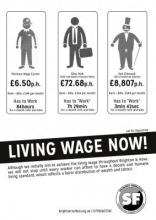The UCU, at a Special Higher Education Sector Conference, has now set out the terms of the continuing dispute centred on pensions and the Four Fights (casualization, workload, equal pay and conditions for women and BAME workers and the broader issue of pay).
Our small but growing Union, the Solidarity Federation Education Union, supports this ballot and argues that workers should vote in favour of strike action to defend our pensions and conditions. With inflation rising, furlough ending, and historic injustices over pay, pensions and conditions continuing to prevail, the only option left to us is downing tools and walking out. To have any chance of success, this action must be both local and national and must build on the gains, small though they were, of the last period of strike action.


